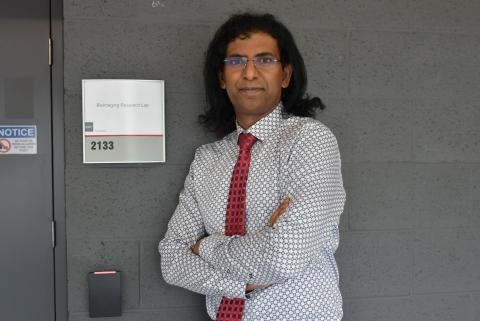University of Guelph start-up uses AI to improve food quality and safety

By Cate Willis
A University of Guelph start-up company is leveraging artificial intelligence (AI) to enhance food quality and safety in the agri-food sector.
Dr. Manick Annamalai [1], an associate professor in the College of Engineering and Physical Sciences [2], established Bioimaging Research Solutions [3] in 2021. The company uses cutting-edge technology and imaging to improve the food production process.
“Our expertise lies in utilizing a diverse range of imaging techniques, encompassing both microscopic and satellite imagery, and deploying artificial intelligence and machine learning to dissect these visuals, yielding invaluable insights,” he says. “We focus on crafting tools for the agri-food sector, covering various stages from farm-level assessments using satellite and drone images for food product development, nutrition and food safety.”
The company works with a wide range of imaging technologies, including infrared imaging, thermal imaging, colour imaging, X-rays and ultrasound to assess the quality of food products.
“Recalls pose a significant challenge for both small and large companies,” says Annamalai. “Bioimaging Research Solutions aims to detect any safety concerns during the early stages before products reach consumers.”
This is where AI comes in.
Employing a process called supervised learning, Annamalai and his team teach the AI system how to recognize and classify different grades or qualities of products using both microscopic and satellite images. They use AI techniques, including pre-trained neural networks, to create a strong and adaptable model that can work well in different situations.
“Food quality is usually assessed through human inspection or lab testing on random samples,” Annamalai says. “Our approach automates this process, allowing for objective assessment of 100 per cent of samples in real-time.
“We can continuously monitor quality and take corrective actions when abnormalities are detected to reduce recalls and ensure consumer safety.”
Using AI has multiple benefits, says Annamalai. It can help avoid costly recalls in the food industry, improve the reputation of products in the global market, meet international quality standards for exports and reduce unnecessary transportation costs.
Bioimaging Research Solutions has worked with the Research Innovation Office (RIO), which played a pivotal role in helping the team secure an office within the Research Park Centre on campus.
“We aimed to establish a stronger presence on campus and provide a space for industry collaborators to engage with us,” Annamalai says. “We expect to grow and have more projects, so we’ll likely need their support for future initiatives.”
Cultivating start-ups like Bioimaging Research Solutions is central to RIO’s mission.
“We empower innovators who are shaping the future, ensuring they have the support and resources needed to thrive,” says Jessica Bowes, assistant vice-president, research (innovation & knowledge mobilization). “RIO is committed to fostering a dynamic ecosystem of research-driven entrepreneurship on our campus.”
The Research Innovation Office [4] is funded in part by the Research Support Fund [5], the Ontario Agri-Food Innovation Alliance [6] and the Canada First Research Excellence Fund. [7]